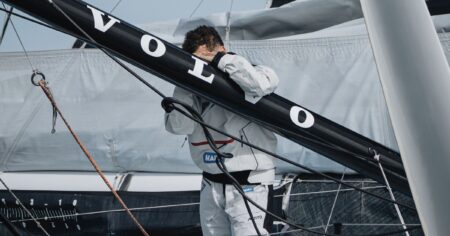The excitement surrounding the Tour de France took a somber turn during Stage 3, as Jasper Philipsen of Alpecin-Deceuninck faced a shocking exit due to a severe crash. The dynamic nature of cycling, especially in a prestigious event like the Tour, often brings unpredictable outcomes. However, Philipsen’s departure left fans and commentators alike with a sense of dismay.
What transpired on the road was both sudden and distressing. During an intermediate sprint segment, the race witnessed an unfortunate collision involving Bryan Coquard from Cofidis and Laurenz Rex from Intermarché-Wanty. The incident escalated when Coquard’s body unexpectedly ricocheted into Philipsen, resulting in a harrowing moment that sent the 25-year-old Belgian flying off his bike. It was a painful and dramatic fall, and the aftermath was captured vividly by the TV cameras.
As viewers observed Philipsen bloodied and struggling, his torn jersey painted a bleak picture of the impact he endured. In a matter of moments, what had been a pivotal competition turned traumatic for one of its promising participants. Following the crash, the grim news broke that Philipsen had officially abandoned the race, a decision that underscored the severity of the encounter. The immediate reaction within the cycling community was one of shock and sorrow.
Rob Hatch, the commentator for TNT Sports, encapsulated the sentiment by describing the incident as “an absolute shocker for the race.” Beyond personal disappointment, this accident represented a significant blow to the ongoing competition. Philipsen had been in stellar form leading up to this stage, having won the opening stage in Lille, which had placed him atop the points classification.
Robbie McEwen, a former professional cyclist and now a commentator with a wealth of experience, further articulated the emotional rollercoaster that accompanies a Tour de France competitor. He remarked, “You go from the highs to the lows; they are so close together.” His words resonate deeply with the reality that cyclists live under an unrelenting pressure throughout the event. The Tour de France is notorious for its demanding stages and unpredictable elements that can change the course of a rider’s journey in an instant.
The competitive spirit of the Tour, characterized by its precarious nature, was encapsulated by McEwen’s acknowledgment of the “knife edge” upon which the athletes balance. With every pedal stroke, the possibility of danger looms, and moments such as Philipsen’s crash serve as stark reminders of the risks involved in professional cycling. As McEwen lamented, “It’s such a shame for the race. You just hate to see it,” his sorrow highlighted the profound impact of Philipsen’s exit not only on the race but also on the collective psyche of spectators and participants.
In the wake of Philipsen’s misfortune, the competition continued, with Biniam Girmay of Intermarché-Wanty stepping into the void left in the points classification. Girmay’s ascent to the virtual lead in the green jersey competition marked a pivotal chapter in the ongoing narrative of the Tour, emphasizing how quickly fortunes can shift in this challenging tour.
Despite the setbacks, fans were reminded that the relentless spirit of the cycling season continues, as riders from all teams prepare for the stages ahead. Those who wish to follow the excitement of the Tour de France, along with other significant cycling events like the Tour de France Femmes, can stream coverage live on platforms such as TNT Sports and discovery+. As the race unfolds, cycling enthusiasts will be eager beyond measure to see how the dynamics of competition evolve in the aftermath of such unexpected incidents.












